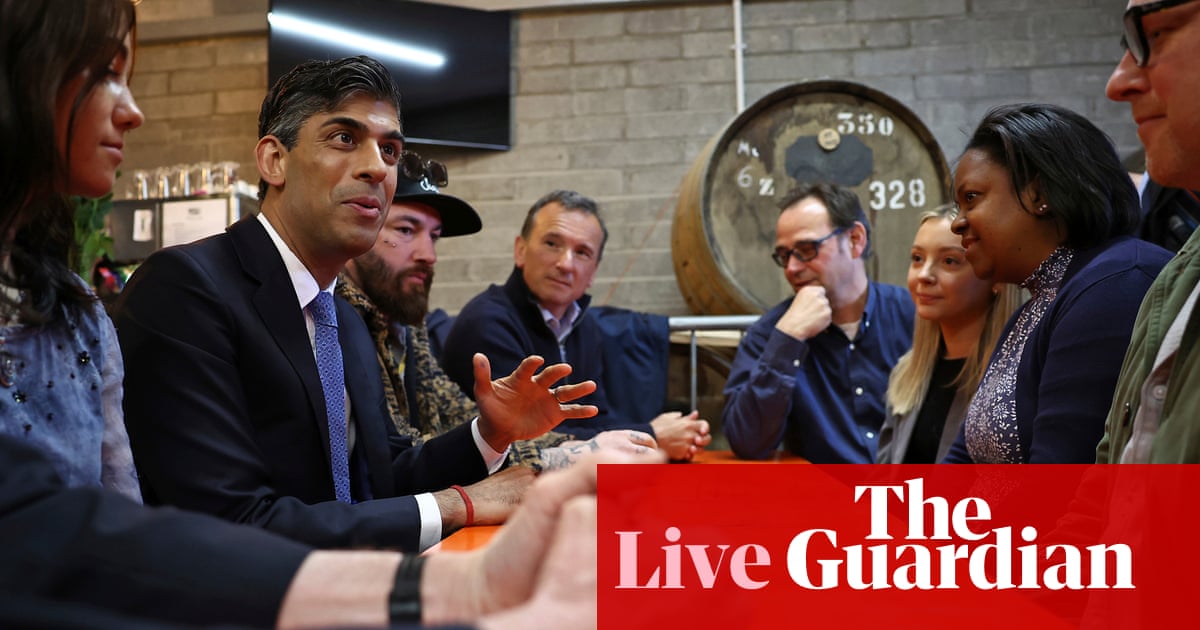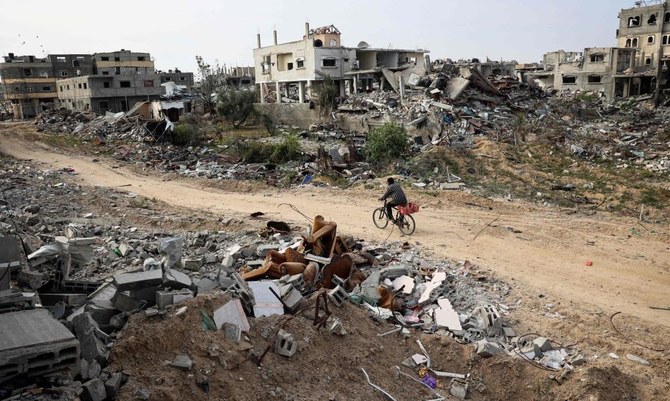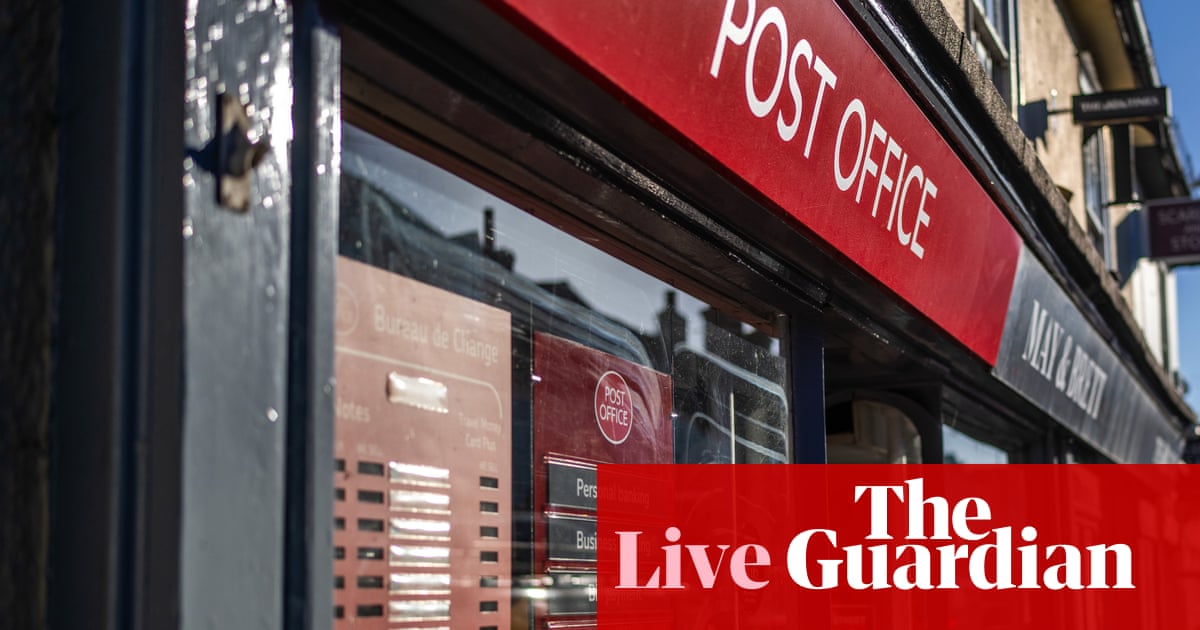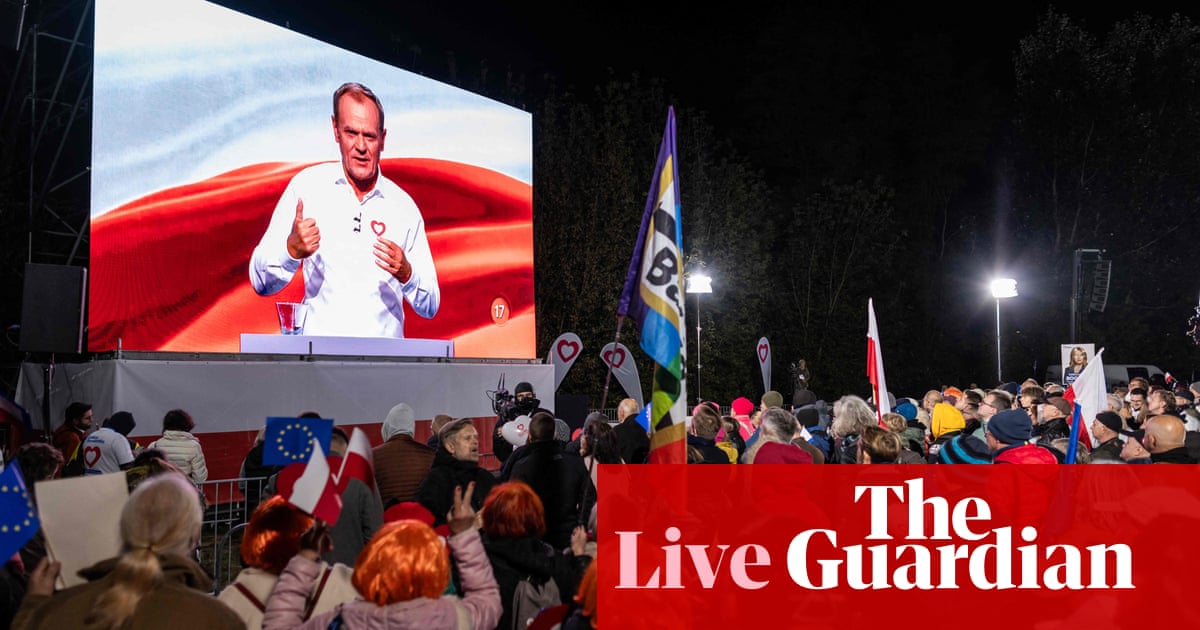
Party leaders join millions across the UK casting their votes
People across the UK have begun casting votes in a general election expected to sweep Rishi Sunak’s Conservatives out of power and usher in Labour’s Keir Starmer as prime minister.
Sunak’s messaging on the day of polling remained about encouraging Tory voters out to “stop the Labour supermajority” rather than positioning himself to continue in Downing Street.
Starmer’s Labour were pushing people to go out and vote for change. Opinion polls suggest Labour is on course to secure a big majority, but last night Starmer told supporters to “imagine a Britain moving forward together with a Labour government. That’s what we are fighting for, let’s continue that fight. If you want change, you have to vote for it.”
Liberal Democrat leader Ed Davey, Scotland’s first minister John Swinney, and Plaid Cymru leader Rhun ap Iorwerth have all also voted. Davey, whose campaign has been marked by a series of extreme stunts, said “It’s a beautiful day. I hope lots of people come out to vote.”
An exit poll, published shortly after polls close at 10pm on Thursday, will provide the first indication of how the election has gone on a national level. These take place at polling stations across the country, with tens of thousands of people asked to privately fill in a replica ballot as they leave, to get an indication of how they voted.
If Starmer were to become prime minister, it would be the first time the UK’s leader has changed as a result of a general election since 2010, when David Cameron succeeded Gordon Brown. Theresa May, Boris Johnson, Liz Truss and Sunak himself all became prime minister after internal Conservative party mechanism rather than through a general election.
Thank you for following along on this blog today. We’ve loved seeing your dog picture submissions and enjoyed reading your comments. I’m signing off now, with a last batch of your dogs at polling stations pics. Have a good evening!
Jon has sent in an adorable picture of Wookie, the dog, taking a well-earned rest in Glynde, East Sussex, “after an eventful six weeks of canvassing”.
Jamie and Kyra have shared a picture of their miniature dachshund Ralph at a polling station in Brixton this morning. Jamie says that Ralph is “clearly not too happy about it” as he’s “usually super smiley”.
This is Burt at Darren’s local polling station in Chesterfield.
Jen has shared a picture of her two dogs, Lily and Jess, at Stapehill village hall in Dorset. I’ve been informed that Lily enjoyed exploring on her first trip to the polling station and Jess “never wants to pose nicely”.
Fozzie the pyredoodle is pictured looking very happy outside a polling station in the Folkestone and Hythe constituency. Fozzie’s owner, Adam, says “he’d love to be put on the Guardian’s general election live page”. Apparently, Fozzie is a “longtime reader”.
“This is Zac the German wirehired pointer at his first general election since he came to live with us in Rockcliffe on the Solway Firth,” says Steve. “He was not impressed [that] he had to wait outside the village hall as he’s usually at the bar. I explained that it’s only, hopefully, every five years.”
Tom has shared this picture of his mum’s dog, Riley the cockapoo. Lovely.
This blog will be closing shortly. But, the great news is that Andrew Sparrow is ready to take you through the general election evening and into Friday morning in this new blog:
The Guardian’s community team want to hear how people are spending Thursday night as results begin to come in.
They would like to hear from UK voters – in the country and abroad – and other residents in the UK, about whether they’ll be following the results tonight.
So, please share your stories and pictures of election night where you are, via the form in the below link.
The Royal National Institute of Blind People (RNIB) has shared a post on X asking people to share their experience of voting by filling in a short survey.
In its post today, the RNIB said that a young lady featured in its video, Khadija, was able to vote independently and in secret using a McGonagle reader.
In the video, Khadija says:
“I went into the polling station and they did have the McGonagle device, so that was great. It was the first time they’d ever used it before and I think I was their first person using it. So, I think they were a bit nervous.
But it worked really well. They did align. I checked that they aligned the ballot correctly underneath. The person assisting me gave me headphones to use with it, which was good for the secret portion of it.
I was a bit worried that it would be more complicated on an election day than the previous times. I’ve used it as a test, but it was really simple to use.
So, it was the first time I’ve ever voted by just listening to the ballot myself and marking the box for myself.”
The RNIB noted though that “not everyone’s voting experiences have gone as smoothly”.
Last week, the RNIB called on all political parties to commit to remove barriers that prevent blind people voting on their own and without help in future elections.
It estimated that 160,000 people in the UK of voting age with severe sight loss would struggle to vote independently because of the lack adjustments made at polling stations.
At the last general election, research for the RNIB found that only 13% of blind people felt they could vote independently and in secret.
The Guardian photographer Jill Mead was granted exclusive access to spend polling day with the deputy leader of the Labour party, Angela Rayner.
You can see Mead’s day on the road with Rayner as the Labour battlebus made its final stops on polling day:
The BBC have a short video on how the elections expert Prof Sir John Curtice prepares for a general election night.
In the clip, Curtice says:
The truth is that preparing for election night begins almost the day after the last election, because you’re trying to work out what happened and why. And that’s important to understanding what’s going to happen in the next election.
Thereafter, it’s a continuous process, following the polls, particularly of course as the election campaign gets on.”
Under bright, blustery skies across most of the UK, British voters went to the polls on Thursday to elect their fourth prime minister in five years, with Keir Starmer’s Labour party heavily tipped to win an overwhelming parliamentary majority and bring to an end 14 years of Conservative-led government.
After weeks of campaigning after Rishi Sunak’s surprise gamble to call a July election, he and the other party leaders cast their votes across the country while making their final appeals to the electorate.
Sunak voted early with his wife, Akshata Murty, in his home constituency of Richmond and Northallerton, urging voters on X to “stop the Labour supermajority which would mean higher taxes for a generation”.
Starmer, accompanied by his wife, Victoria, was met by a small group of supporters at a polling station in Kentish Town, north London. On social media, he repeated Labour’s campaign theme that “it is time for change”.
The leader of the Liberal Democrats, Ed Davey, the Green party co-leader, Carla Denyer, and party leaders in Wales, Scotland and Northern Ireland were also pictured at their constituencies.
Davey, whose campaign has been characterised by stunts including bungee jumps, water slides and Zumba dancing, paid tribute to his wife, saying: “Without my rock, Emily, I simply would not be on the ballot paper.”
Jeremy Corbyn, running against Labour in his north London constituency after being expelled by the party he formerly led, tweeted: “I just voted for the independent candidate in Islington North. I hear he’s alright.” The Reform UK leader, Nigel Farage, posted a TikTok video of himself buying a drink in a Clacton pub.
Thank you for sending in your pictures of dogs at polling stations today. Here are a few more that have popped up in my inbox:
Pam has sent a lovely message saying that she’s enjoying seeing all the dog pictures making it on to the live blog today.
This sweet pooch is Lola, Pam’s parson russell terrier, making her first visit to a polling station in the Angus and Perthshire Glens constituency in Scotland.
Barnaby has shared a picture of a very keen Freddie from 7.15am this morning. He was “desperate to get to the polling station in Hackney,” says Barnaby. Incidentally, it’s also where his pal, Duster, was this morning (16:04 BST).
“Here’s Crumble, fulfilling her civic duty in Hove, this morning,” says Simon. Excellent work.
Christian has got in touch to share a picture of his friend’s dog, Lenny the dachshund, that he’s looking after.
“I took a photo of him waiting outside – eager to know the results. It’s going to be a long day,” says Christian.
Basset hounds Pippin and Padfoot have also been our at a polling station today. This time in Lewisham, along with owner, Rob.
This “pensive pooch”, pictured in south-east London was provided by Terry.
The UK is not the diplomatic powerhouse it once was, with Brexit leaving it looking inward and years of economic failures meaning the Conservatives and Labour are both sidelining foreign policy in their campaign messaging. Still, leaders around the world (some more than others) will be taking an interest in the 4 July election.
Live election results for the UK’s 650 constituencies will start to be announced at about 11:30pm. You can follow the results later via our live tracker.
There’s also an election night guide, via the Guardian’s Today in Focus podcast. Presented and produced by Lucy Hough with Archie Bland, it has tips on when to set your alarm for the potential Portillo-moments, the seats to watch and how to make it through to dawn.
The Scottish Conservative leader Douglas Ross has voted and shared a picture of himself with a dog outside the polling station. Everyone is getting in on it.
“It has been a terrible general election. The least we can do is learn from it,” writes the Guardian’s executive opinion editor, Hugh Muir.
Muir writes:
It started with dark comedy. The sight of Rishi Sunak, behind the podium at No 10, drenched by the rain – a drowned rat in a sharp suit, drowned out by a hostile loudspeaker, bellowing out the fact of his sudden-death election – belonged to vaudeville.
The race itself belonged to Hobbes: “poor, nasty, brutish and short”.
And at the end, after all the speeches, the televised debates, the photo ops, the accusations, the helicopter rides, the leaflet-filled vehicles crisscrossing the country, the vox pops, what did we learn about our country and our politics?
We learned more about the foolish recklessness of those who have ruled us. Sunak called his election for himself and for his party and for his faction. There was nothing further from his mind, as he dripped rainwater, than the good of the nation or our democracy. He had no plan, other than to parrot the inanity that “the plan” was working. Tell that to the food bank volunteers or the coastguard at Dover.
What happens next for former MPs defeated at the general election? Well, the PA news agency’s parliamentary editor, Richard Wheeler, has answered just that question, and more, in this explainer:
When did they stop being an MP?
Parliament was dissolved on 30 May and at that point there ceased to be any MPs until the election took place. Ministers continue in their roles and remain in post until a new government is formed.
What happens next for a former MP who failed to be re-elected?
For some, the defeat will be a surprise, for others they will have seen the writing on the wall during the campaign. There will be several removal vans on the parliamentary estate in the coming days and weeks as the former MPs clear out their offices and make way for the new intake.
It is expected some new MPs will start arriving in parliament just hours after the results are announced as they begin a new chapter in their lives.
They will eventually be assigned office space in parliament by their party whips once the areas have been cleared out.
What help is available to former MPs?
The taxpayer-funded Independent Parliamentary Standards Authority (Ipsa) – which governs MPs’ expenses – supports those candidates who have lost their seat.
Winding-down payments are designed to help departing MPs close their office and manage the departure of staff. They have up to four months to carry out the necessary tasks.
How much financial support is there?
Former MPs are entitled to receive a one-off winding-up payment to help them close down their parliamentary affairs. This is the equivalent of four months of their salary, minus tax and national insurance contributions.
The basic annual salary for an MP is £91,346. The government’s tax calculator estimates this would mean take-home pay is £63,541.68 – which would suggest four months of salary is about £21,000.
Former MPs are also able to claim for certain costs during the winding-up period, including office rent.
What is the loss of office payment?
A candidate who loses their seat or stands unsuccessfully in a different seat could also be eligible to receive a loss of office payment. It is similar to a redundancy payment and is equal to double the statutory redundancy entitlement.
It will therefore vary by individual as it takes into account age as well as length of service. Ipsa guidelines state a former MP will be eligible for such a payment if they held office for a continuous period of at least two years at the point they lost their seat.
And what about ministers who lose their jobs in government as a result of the election result?
Regardless of whether an outgoing minister remains an MP or not, they are entitled to receive severance pay, as outlined in 1991 legislation. This is separate from winding-up payments and loss of office entitlement.
The severance pay amounts to 25% of the annual ministerial salary they were being paid.












